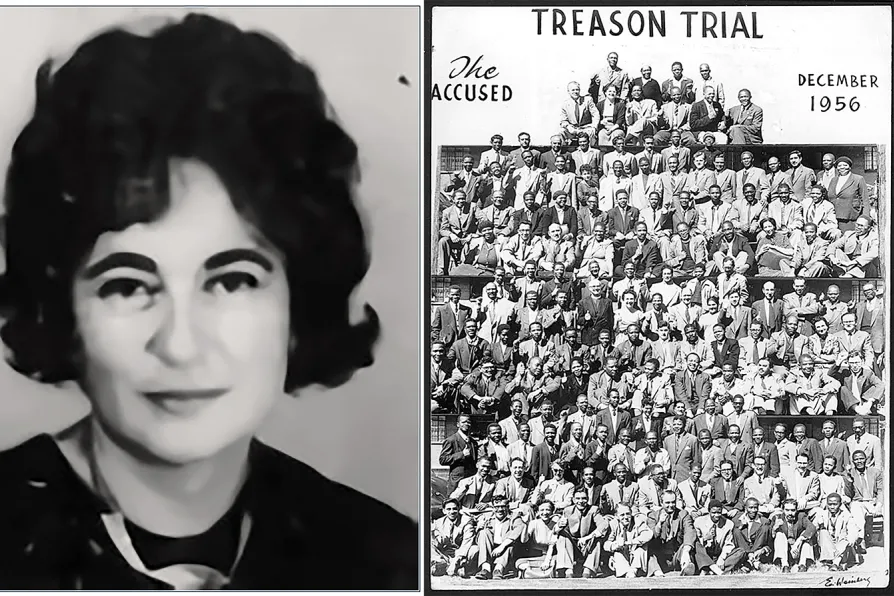John Wojcik pays tribute to a black US activist who spent six decades at the forefront of struggles for voting rights, economic justice and peace – reshaping US politics and inspiring movements worldwide
RONNIE KASRILS pays tribute to Ruth First, a fearless fighter against South African apartheid, in the centenary month of her birth

 Writer and freedom fighter Ruth First and (right) defendants at the 1956 Treason Trial pose for a photo
Writer and freedom fighter Ruth First and (right) defendants at the 1956 Treason Trial pose for a photo
THIS month marks the centenary of the birth of Ruth First, a revolutionary, journalist, scholar and relentless fighter for justice. Born in Johannesburg in 1925, she dedicated her life to the struggle against apartheid, racism and colonialism. Her parents, members of the Communist Party of South Africa, instilled in her a deep sense of justice and solidarity. Her mother nurtured a profound love of reading from an early age.
This upbringing set her on a path of activism that would span decades and continents.
As a student at Wits, it was immediately clear that First possessed remarkable intellectual gifts and the kind of courage and commitment required to harness them to the struggle. She became deeply involved in political debates and student activism, often engaging with leaders like Nelson Mandela and Eduardo Mondlane. She became a leading figure in the Young Communist League, where her commitment to Marxist theory deepened and her understanding of class struggle began to take root.
She was a brilliant radical journalist whose investigative journalism exposed the conditions of oppression, including her seminal reporting on the farm labour scandals in Bethal, where black workers were exploited under brutal conditions. Her journalism was never simply reportage. It was an intervention in the battle of ideas, exposing the lies of the apartheid regime, countering its ideology, and sharpening the thinking in the struggle. It was political work of the highest order, carried out with a clarity and urgency rooted in revolutionary discipline.
In the 1950s, she was among the 156 activists arrested and tried in the Treason Trial, standing alongside her husband Joe Slovo and other key figures of the liberation movement. Her commitment did not waver. She wrote powerfully about the mobilisation against the pass laws that culminated in the Women’s March of 1956, documenting the courage of the 20,000 women who stood in defiance of apartheid’s systematic control.
After the Sharpeville Massacre of 1960, First continued her work underground, supporting Umkhonto we Sizwe, the armed wing of the ANC. Arrested in 1963 under the 90-Day Detention Law, she was held in solitary confinement for 117 days — an experience she later wrote about in her book 117 Days. It was a harrowing account of psychological torture. Despite the cruelty she endured, she refused to surrender any information to her captors.
Exiled to London in 1964, she became a prominent voice in the Anti-Apartheid Movement and a leading scholar on African politics. In 1977, she moved to Maputo to take up a senior academic post at Eduardo Mondlane University. She brought the same disciplined approach to research as she did to resistance and she produced superb work grounded in a commitment to ensure that scholarship should serve the people. Her intellectual contribution included a series of brilliant books on politics across Africa.
First was also a staunch supporter of the Palestinian cause. During the six-day war in 1967, she stood firmly with the Palestinian people, believing that their struggle for liberation was part of the same global fight against oppression and colonialism. She stood in solidarity with liberation struggles across Africa and beyond, including Angola, Mozambique, and Vietnam. She believed that imperialism was a global system that had to be confronted wherever it appeared.
First was assassinated on August 17 1982, in Maputo, Mozambique. A parcel bomb, sent by the apartheid regime, ended her life. Her assassination was part of a series of brutal attacks by the apartheid state against those who stood for justice.
Her death sent shockwaves through the liberation movement. In his funeral oration, Moses Mabhida declared: “The bomb that took Comrade Ruth’s life was intended to deprive our movement of the services of one of its most gifted militants. We openly acknowledge the exceptional gravity of the loss to us caused by her death. But we equally proclaim that her immense contribution to our movement will never be lost but will help to guide our actions and inspire our militants in the years to come.”
First exemplified the unity of thought and action. She had no patience for abstract posturing. For her, theory was not something to be debated in isolation, but to be tested and refined in the heat of struggle. Her work was always grounded in the realities of the oppressed and harnessed to the struggle for their liberation.
Ruth did not seek prominence. She believed in collective leadership, accountability to the movement, and clarity of purpose. She brought rigour to every meeting and seriousness to every task.
This month, as we remember the centenary of her birth, we honour her unwavering commitment to justice, her fearless intellect, and her belief in the power of international solidarity.
Ronnie Kasrils is a member of the SACP central committee, a founder member of MK and a former government minister. This article is a summary of a much longer talk given to the Young Communist League on May 15.

The shared path of the South African Communist Party and the ANC to the ballot box has found itself at a junction. SABINA PRICE reports

SALEEM BADAT and VASU REDDY introduce a new book about an outstanding interpreter of the world, and an activist scholar committed to changing society

The charter emerged from a profoundly democratic process where people across South Africa answered ‘What kind of country do we want?’ — but imperial backlash and neoliberal compromise deferred its deepest transformations, argues RONNIE KASRILS










